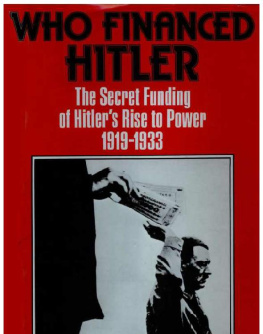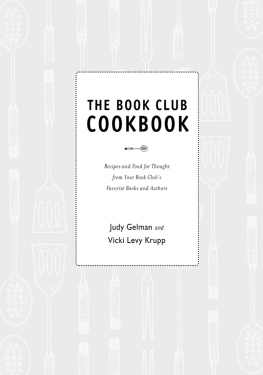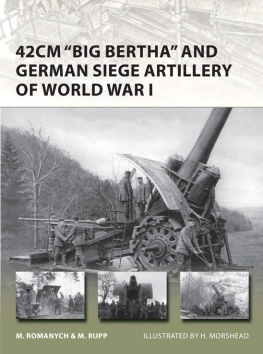Afterword to the Cooper Square Press Edition
MUCH HAS happened to the House of Krupp since this book was first written in 1966. For one, the year turned out disastrously for the firm. Not only did sales dip for the first time since its postwar reconstruction, but losses for the year amounted to $12.5 million and debts rose to more than $1.3 billionenormous figures for those days. The latter was due mostly to over-ambitious expansion outside Germany, especially in Spain and Russia, where business had been obtained by offering easy credit terms. In some cases borrowers were offered fifteen years at which to pay and at interest rates lower than the rates that Krupp borrowed at in Germany.
Krupp Comes a Cropper was the indelicately eager headline in Londons Daily Telegraph, a right-wing newspaper. Krupp Kaput? asked the New Statesman, a left-inclined weekly that went on to claim, somewhat prematurely, that the end is in sight for the greatest industrial anachronism of the 20th century. It turned out that Krupp had become far too dependent on exports. Many of its managers had worried about Berth-old Beitzs overzealousness in seeking out eastern European customers at whatever the cost, but had been afraid to speak out. Why go to Indonesia or Bolivia when eastern Europe is on our doorstep? Beitz had maintained on many occasions. But whereas the West German government in Bonn handed the financing for ten years of exports to relatively undeveloped countries like Indonesia and Bolivia, and even guaranteed eighty percent of such payments, it did nothing for exports to Eastern Europe. Quite the reverse, it discouraged business behind the Iron Curtain. Now that particularly foolish chicken was coming home to roost for Krupp. In addition, within Germany nearly $100 million had just been spent on a new wide-strip hot rolling mill in Bochum at a time when the steel market was already oversaturated with such capacity.
Like many an old-style entrepreneur, Alfried had hitherto been inclined to base his business decisions on intuition rather than on painstaking, detailed assessment. But whereas intuition had once been a source of strength for such entrepreneurs, in an increasingly complicated world it was more often than not proving to be their weakness and sometimes their undoing. That was certainly the case for Alfried, who in addition let Beitz handle most of his day-to-day affairs. However, the factor that perhaps contributed most to his downfall was his having clung stubbornly to private proprietorship instead of widening the share-ownership. Four-fifths of Krupps working capital was borrowed money, and such a high ratio was bound to spell trouble when the boom turned to slump business (as happened in Germany in the mid-1960s).
Alfried now found himself in the classic bankruptcy situation of having lent long while having borrowed short. In other words, he had a cash flow problem. At least half of his debts were short-term loans that the banks had allowed him to roll over continually. But now those banks were reluctant to bail him out furtherindeed he was said to be already in hock to 263 financial institutions, some of whom were threatening to foreclose. It was these insupportable debts that caused the firms collapse.
While any other business would not have been spared, the House of Krupp was still a special case in German eyes. The federal government in Bonn persuaded the banks to extend their existing loans until at least the end of 1968 and chipped in itself with $75 million worth of temporary credits that were matched with half as much from the local North Rhine-Westphalian state government that runs the Ruhr. These credits were eventually extended both in time and amount, the latter by $100 million. However, rival German industrialists were incensed that the government was bailing out a competitor through their taxes.
But aid from the public coffers came at a price. Alfried Krupp and Berthold Beitz turned over the day-to-day running of their tottering empire to a committee of bankers and official appointees, thus allowing, as an insider put it, strangers to meddle in affairs that had hitherto been thought strictly domestic. Alfried also had to agree to surrender his single ownership of the House of Krupp by making it a public corporation before the end of 1968, and issuing shares in it for sale. The Financial Times of London said, The Krupp concern, last great German stronghold of the individual industrialist who runs his business like a piece of personal property, surrendered today to the temper of the times. Another commentator said, Where the Allies failed to control Krupp, the bankers have succeeded.
The German press criticized the flamboyant, gregarious Beitz far more than the reticent and reclusive Alfried. He blamed the dbcle on Beitz having relished too much his self-appointed role as West Germanys unofficial ambassador to the Soviets, which distracted him from the realities of the Ruhr. In the midst of the crisis Alfried had become increasingly remote, shunning people and living an almost solitary life. Among his chief pleasures were hunting, shooting, and cruising in his ocean-going yacht, Germania. In a surprising outburst the highly conservative Frankfurter Allgemeine derided Krupps business policies as appropriate to a small corner-shop or general store.
In preparation for the changeover, Alfrieds heir, Arndt, who had hitherto shown little interest in the family business (preferring the life of a jet-setting playboy), duly renounced his heritage in early 1967 and settled for an annual $250,000 allowance to be doubled on his fathers death. This paved the way for the whole of Alfrieds holdings to pass into the hands of a foundation, the profits from which would be devoted to furthering scientific research (as under German law Arndt would have been entitled to fifty percent of his fathers fortune). But in a Wagnerian twist, Alfried was spared the humiliation of witnessing the end of his familys personal rule over the 156-year old concern. He died of lung cancer in July 1967, just two weeks before his sixtieth birthday. Said the Financial Times, West Germany has lost the last of its great paternalists. Eleven weeks later, Alfrieds second wife Vera died of diabetes in Los Angeles, California.
With their deaths the Krupp family name died out, for Alfrieds two surviving brothers, as well as his son, bore the name of von Bohlen and Halbach. Hitlers Lex Krupp (which circumvented the laws of inheritance that then prevailed, in keeping the firm as a family property) had not encompassed them. Indeed, Arndts renunciation of his inheritance before Alfrieds death had spared the West German government the embarrassment of having to decide whether or not to invoke the Lex Krupp. Arndt had declared then, All my forefathers have experienced much unhappiness from personally owning this enterprise, and I want to break away from it. I am not like my father, who sacrifices his whole life for something without even knowing whether or not it is worth it.
West German President Heinrich Lubke wrote to him when Alfried died, Your fathers life and work were most intimately bound up with the fate of the Fatherland. Six years earlier, on the occasion of Krupps 150th anniversary, Lubke had written to Alfried, The history of your firm mirrors the triumphs and disasters of our people. He could have said, without any exaggeration, that the Krupp saga was so saturated in melodrama that the latest act was merely in keeping with what had gone before.
The irony was that if Alfried had sold his coal and steel interests, as the Allies ordained after the war, and moved into more profitable industries as his competitors did, he would almost certainly have avoided the liquidity problems, as it was the slump in coal and steel during the mid-1960s that fatally weakened the House of Krupp. Indeed, coal and steel accounted for more than half of Krupps $12.5 million losses in the fateful year of 1966. Cheaper American imports steadily undercut demand for European coal, while oil was rapidly replacing coal in power production. German steel also faced strong competition from abroad.







